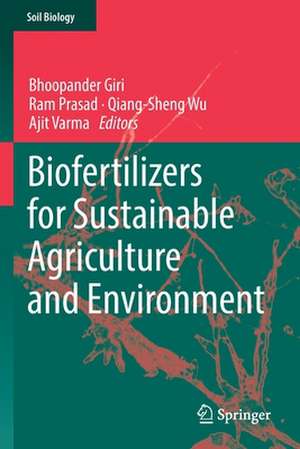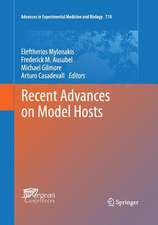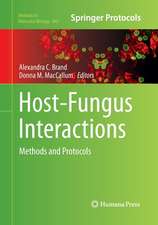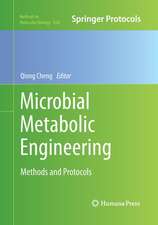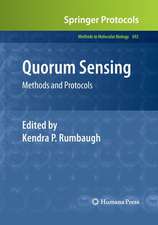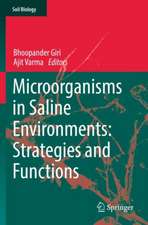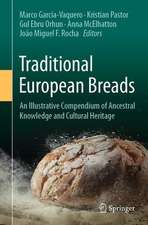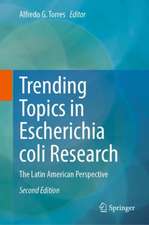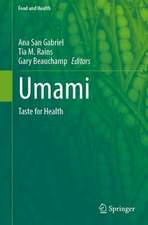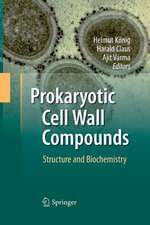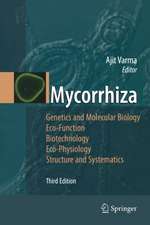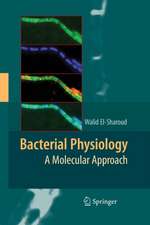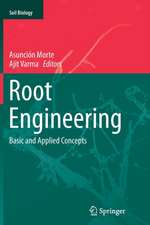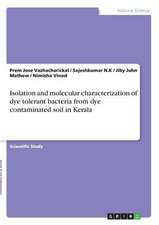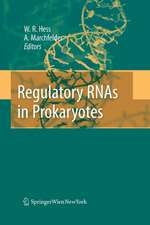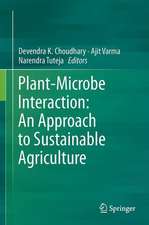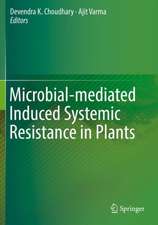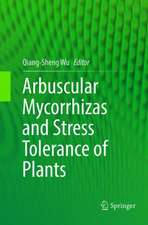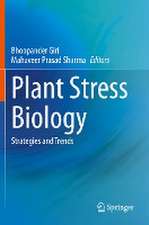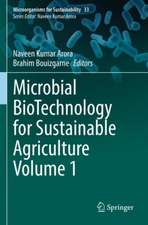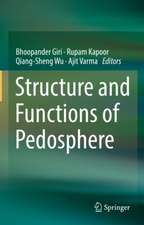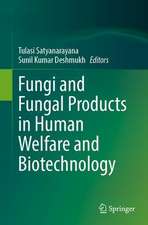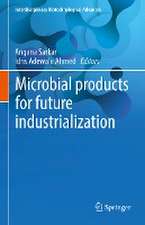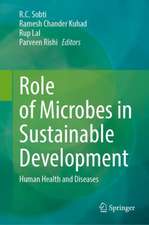Biofertilizers for Sustainable Agriculture and Environment: Soil Biology, cartea 55
Editat de Bhoopander Giri, Ram Prasad, Qiang-Sheng Wu, Ajit Varmaen Limba Engleză Paperback – 25 aug 2020
Agricultural production has increased massively over the last century due to increased use of chemical fertilizers and pesticides, but these gains have come at a price. The chemicals are not only expensive; they also reduce microbial activity in agricultural soils and accumulate in the food chain, with potentially harmful effects for humans. Accordingly, it is high time to explore alternatives and to find solutions to overcome our increasing dependence on these chemicals.
Biofertilizers, which consist of plant remains, organic matter and microorganisms, might offer an alternative. They are natural, organic, biodegradable, eco-friendly and cost-effective. Further, the microbes present in the biofertilizers are important, because they produce nutrients required for plant growth (e.g., nitrogen, phosphorus, potassium), as well as substances essential for plant growth and development (e.g., auxins and cytokinins). Biofertilizers also improve the physical properties, fertility and productivity of soil, reducing the need for chemical fertilizers while maintaining high crop yield. This makes biofertilizers a powerful tool for sustainable agriculture and a sustainable environment.
The book covers the latest research on biofertilizers, ranging from beneficial fungal, bacterial and algal inoculants; to microbes for bioremediation, wastewater treatment; and recycling of biodegradable municipal, agricultural and industrial waste; as well as biocontrol agents and bio-pesticides. As such, it offers a valuable resource for researchers, academics and students in the broad fields of microbiology and agriculture.
| Toate formatele și edițiile | Preț | Express |
|---|---|---|
| Paperback (1) | 1556.01 lei 6-8 săpt. | |
| Springer International Publishing – 25 aug 2020 | 1556.01 lei 6-8 săpt. | |
| Hardback (1) | 1562.31 lei 6-8 săpt. | |
| Springer International Publishing – 24 aug 2019 | 1562.31 lei 6-8 săpt. |
Din seria Soil Biology
- 18%
 Preț: 958.56 lei
Preț: 958.56 lei - 18%
 Preț: 1225.62 lei
Preț: 1225.62 lei - 18%
 Preț: 957.75 lei
Preț: 957.75 lei - 18%
 Preț: 1232.09 lei
Preț: 1232.09 lei - 18%
 Preț: 949.90 lei
Preț: 949.90 lei - 18%
 Preț: 1392.95 lei
Preț: 1392.95 lei - 18%
 Preț: 952.26 lei
Preț: 952.26 lei - 18%
 Preț: 1231.32 lei
Preț: 1231.32 lei - 18%
 Preț: 956.03 lei
Preț: 956.03 lei - 18%
 Preț: 948.29 lei
Preț: 948.29 lei - 18%
 Preț: 1224.18 lei
Preț: 1224.18 lei - 18%
 Preț: 1226.90 lei
Preț: 1226.90 lei - 18%
 Preț: 952.26 lei
Preț: 952.26 lei - 18%
 Preț: 942.63 lei
Preț: 942.63 lei - 18%
 Preț: 946.55 lei
Preț: 946.55 lei - 18%
 Preț: 1221.20 lei
Preț: 1221.20 lei - 18%
 Preț: 1225.94 lei
Preț: 1225.94 lei - 18%
 Preț: 946.24 lei
Preț: 946.24 lei - 24%
 Preț: 1051.27 lei
Preț: 1051.27 lei - 18%
 Preț: 1221.02 lei
Preț: 1221.02 lei - 18%
 Preț: 947.98 lei
Preț: 947.98 lei - 18%
 Preț: 948.47 lei
Preț: 948.47 lei - 18%
 Preț: 1222.31 lei
Preț: 1222.31 lei - 18%
 Preț: 1231.64 lei
Preț: 1231.64 lei - 18%
 Preț: 1225.31 lei
Preț: 1225.31 lei - 18%
 Preț: 1229.73 lei
Preț: 1229.73 lei
Preț: 1556.01 lei
Preț vechi: 1897.57 lei
-18% Nou
Puncte Express: 2334
Preț estimativ în valută:
297.82€ • 309.75$ • 249.57£
297.82€ • 309.75$ • 249.57£
Carte tipărită la comandă
Livrare economică 13-27 martie
Preluare comenzi: 021 569.72.76
Specificații
ISBN-13: 9783030189358
ISBN-10: 303018935X
Pagini: 544
Ilustrații: XVI, 544 p. 65 illus., 50 illus. in color.
Dimensiuni: 155 x 235 mm
Greutate: 0.78 kg
Ediția:1st ed. 2019
Editura: Springer International Publishing
Colecția Springer
Seria Soil Biology
Locul publicării:Cham, Switzerland
ISBN-10: 303018935X
Pagini: 544
Ilustrații: XVI, 544 p. 65 illus., 50 illus. in color.
Dimensiuni: 155 x 235 mm
Greutate: 0.78 kg
Ediția:1st ed. 2019
Editura: Springer International Publishing
Colecția Springer
Seria Soil Biology
Locul publicării:Cham, Switzerland
Cuprins
1. Microbial Biofertilizers: Types and Applications.- 2. Fungal Inoculants for Native Phosphorus Mobilization.- 3. Potential Applications of Algae-based Biofertilizer.- 4. Ectomycorrhizal Fungi: Role as Biofertilizers in Forestry.- 5. Perspectives on the Role of Arbuscular Mycorrhizal Fungi in the in-vivo Vegetative Plant Propagation.- 6. Silicon (Si) and Zinc (Zn) Solubilizing Microorganisms: Role in Sustainable Agriculture.- 7. Status and prospects of bacterial inoculants for sustainable management of agroecosystems.- 8. Plant Nutrient Management Through Inoculation of Zinc Solubilizing Bacteria for Sustainable Agriculture.- 9. Endophytic Bacteria as A Modern Tool for Sustainable Crop Management Under Stress.- 10. Biofertilizers in Argentina.- 11. Rhizobial Inoculants for Sustainable Agriculture: Prospects and Applications.- 12. Biofertilizer and their role in sustainable agriculture.- 13. The use of Microorganisms for the Biodegradation of Sewage Sludge and the Productionof Biocompost for Sustainable Agriculture.- 14. Circadian Rhythms in Plant Microbe Interaction: For Better Performance of Bioinoculants in the Agricultural Fields.- 15. The Actinobacteria and Their Role as Plant Probiotics.- 16. Organic Fertilizer from Algae: A Novel Approach Towards Sustainable Agriculture.- 17. Phosphate Solubilizing Fungi and Their Potential Role in Sustainable Agriculture.- 18. Fungi as Biological Control Agents.- 19. Biocontrol Agents: Potential of Biopesticides for Integrated Pest Management.- 20. Microbial-Mediated Plant Growth Promotion: A Mechanistic Overview on Cultivable Plant Growth Promoting Members.- 21. Mycorrhizas and Tolerance of Abiotic Stress in Citrus Plants.- 22. Arbuscular Mycorrhizal Fungi (AMF) from Heavy Metal Contaminated Soils: Molecular Approach and Application in Phytoremediation.- 23. The Role of Arbuscular Mycorrhiza in Sustainable Environment and Agriculture.- 24. Microbe-Mediated Removal of Heavy Metals for Sustainable Agricultural Practices.
Notă biografică
Dr. Bhoopander Giri: Received his Ph.D in Mycorrhizal Research from the Department of Botany, University of Delhi in 2001. Dr Giri has worked as a post-doctoral fellow at the Department of Plant Pathology, North Carolina State University, USA and is currently working as an Assistant Professor at the Department of Botany, Swami Shraddhanand College, University of Delhi, Delhi. He is a recipient of CSIR Research Associateship (2003), DST Young Scientist Fellowship (2005) and Raman Post-Doctoral Fellowship. He has served as a General Secretary (from 2013-2015) for International Symbiosis Society (ISS), USA. Dr. Giri is a life-member/member of many prestigious academic societies. Besides, he serves as a reviewer for several international and national journals, including Experimental and Environmental Botany, Planta, Applied Soil Ecology, Journal of Plant Growth Regulation, Agroforestry System, Colloids and Surfaces B: Biointerfaces, Scientia Horticulture, Acta Physiologia Plantarum, Spanish Journal of Agricultural Research, Journal of Experimental Botany, Institute for Life Long Learning (ILLL), University of Delhi (e-content) and UGC-CEC (pre-view subject expert). Dr. Giri has published more than 38 papers in the national and international peer-reviewed journals and books. His paper “Arbuscular mycorrhizal fungi in alleviation of salt stress” published in Annals of Botany Oxford Press, UK has been listed among TOP 10 cited publications (from 2009-2014) in the area of Biological Science and Agriculture by International Comparative Performance of India’s Research Base, Department of Science and Technology Report 2015, India. He has presented research papers in several national and international conferences (Switzerland, Canada and USA etc) and also served as organizing secretary. Dr. Giri has edited a book “Root Biology” published by Springer International Publishing AG.
Dr. Ram Prasad: Associated with Amity Institute of Microbial Technology, Amity University, Uttar Pradesh, India since 2005. His research interest includes plant-microbe-interactions, sustainable agriculture and microbial nanobiotechnology. Dr. Prasad has more than hundred publications to his credit, including research papers, review articles & book chapters and five patents issued or pending, and edited or authored several books. Dr. Prasad has twelve years of teaching experience and he has been awarded the Young Scientist Award (2007) & Prof. J.S. Datta Munshi Gold Medal (2009) by the International Society for Ecological Communications; FSAB fellowship (2010) by the Society for Applied Biotechnology; the American Cancer Society UICC International Fellowship for Beginning Investigators, USA (2014); Outstanding Scientist Award (2015) in the field of Microbiology by Venus International Foundation; BRICPL Science Investigator Award (ICAABT-2017) and Research Excellence Award (2018). Previously, Dr. Prasad served as Visiting Assistant Professor,Whiting School of Engineering, Department of Mechanical Engineering at Johns Hopkins University, USA and presently, working as Research Associate Professor at School of Environmental Sciences and Engineering, Sun Yat-Sen University, Guangzhou, China.
Qiang-Sheng Wu: Received his PhD in pomology from Huazhong Agricultural University in 2006. Now, he is working as a professor at the College of Horticulture and Gardening, Yangtze University, and as an administrative director at the Institute of Root Biology, Yangtze University. In addition, Dr. Wu is an invited professor at the Univerzita Hradec Králové. Professor Wu focused on the arbuscular mycorrhizal researches in fruit trees. He concerns the functioning and physiology of arbuscular mycorrhizas in plant and soil, especially in citrus plants. At present, he works at the research in the signaling communication by common mycorrhizal network, the functioning and evaluation of glomalin-related soil protein, the physiology-molecular mechanisms about mycorrhiza-enhanced tolerance of drought stress and salt stress, and the relationship between mycorrhizas and root morphology or root hairs.
Until now, he has published two book titled Arbuscular Mycorrhizas and Stress Tolerance of Plants and Arbuscular Mycorrhizal Research and Application of Horticultural Plants and several chapters of relevant books. He published more than 60 papers in the international popular journals, such as Soil Biology and Biochemistry, Scientific Reports, Mycorrhiza, Applied Soil Ecology, Soil and Tillage Research, Frontiers in Microbiology, PLoS One, Fungal Ecology, Journal of Plant Physiology, Journal of Plant Growth Regulation, European Journal of Soil Biology, Scientia Horticulturae, etc. He also published more than 30 papers in Chinese journals. He is invited as reviewers to review lots of manuscripts from popular journals, including Applied Soil Ecology, Environmental and Experimental Botany, Microbial Ecology, Plant Physiology and Biochemistry, European Journal of Soil Biology, Scientia Horticulturae, Plant Biology, Journal of Plant Growth Regulation, Functional Plant Biology, etc. Dr. Wu conducts ten projects, guided two doctors and 18 master’s students, served as the editor of eight international journals and the member of Citrus Association in Hubei Province, and obtained the Fourth Scopus Young Researcher Award.
Prof. Dr. Ajit Varma: Professor Varma has completed his PhD at the age of 25 years from Allahabad University and Former Professor, School of Life Sciences, Jawaharlal Nehru University, India. Presently, he is the Distinguished Scientist & Professor of Eminence of Amity Institute of Microbial Technology; Group Dy. Vice Chancellor, Ritnand Balved Education Foundation, and Vice Chairman, Amity Science, Technology & Innovation Foundation Amity University Uttar Pradesh, India. He has published more than 314 papers in reputed journals and has been serving asan editor in Chief of Soil Biology Series, Springer Verlag Germany. Dr Varma is the Fellow of Alexander-von-Humboldt Society, Germany, elected Fellow of National Academy Agricultural Sciences and Fellow of Microbiology Society of India.
Dr. Ram Prasad: Associated with Amity Institute of Microbial Technology, Amity University, Uttar Pradesh, India since 2005. His research interest includes plant-microbe-interactions, sustainable agriculture and microbial nanobiotechnology. Dr. Prasad has more than hundred publications to his credit, including research papers, review articles & book chapters and five patents issued or pending, and edited or authored several books. Dr. Prasad has twelve years of teaching experience and he has been awarded the Young Scientist Award (2007) & Prof. J.S. Datta Munshi Gold Medal (2009) by the International Society for Ecological Communications; FSAB fellowship (2010) by the Society for Applied Biotechnology; the American Cancer Society UICC International Fellowship for Beginning Investigators, USA (2014); Outstanding Scientist Award (2015) in the field of Microbiology by Venus International Foundation; BRICPL Science Investigator Award (ICAABT-2017) and Research Excellence Award (2018). Previously, Dr. Prasad served as Visiting Assistant Professor,Whiting School of Engineering, Department of Mechanical Engineering at Johns Hopkins University, USA and presently, working as Research Associate Professor at School of Environmental Sciences and Engineering, Sun Yat-Sen University, Guangzhou, China.
Qiang-Sheng Wu: Received his PhD in pomology from Huazhong Agricultural University in 2006. Now, he is working as a professor at the College of Horticulture and Gardening, Yangtze University, and as an administrative director at the Institute of Root Biology, Yangtze University. In addition, Dr. Wu is an invited professor at the Univerzita Hradec Králové. Professor Wu focused on the arbuscular mycorrhizal researches in fruit trees. He concerns the functioning and physiology of arbuscular mycorrhizas in plant and soil, especially in citrus plants. At present, he works at the research in the signaling communication by common mycorrhizal network, the functioning and evaluation of glomalin-related soil protein, the physiology-molecular mechanisms about mycorrhiza-enhanced tolerance of drought stress and salt stress, and the relationship between mycorrhizas and root morphology or root hairs.
Until now, he has published two book titled Arbuscular Mycorrhizas and Stress Tolerance of Plants and Arbuscular Mycorrhizal Research and Application of Horticultural Plants and several chapters of relevant books. He published more than 60 papers in the international popular journals, such as Soil Biology and Biochemistry, Scientific Reports, Mycorrhiza, Applied Soil Ecology, Soil and Tillage Research, Frontiers in Microbiology, PLoS One, Fungal Ecology, Journal of Plant Physiology, Journal of Plant Growth Regulation, European Journal of Soil Biology, Scientia Horticulturae, etc. He also published more than 30 papers in Chinese journals. He is invited as reviewers to review lots of manuscripts from popular journals, including Applied Soil Ecology, Environmental and Experimental Botany, Microbial Ecology, Plant Physiology and Biochemistry, European Journal of Soil Biology, Scientia Horticulturae, Plant Biology, Journal of Plant Growth Regulation, Functional Plant Biology, etc. Dr. Wu conducts ten projects, guided two doctors and 18 master’s students, served as the editor of eight international journals and the member of Citrus Association in Hubei Province, and obtained the Fourth Scopus Young Researcher Award.
Prof. Dr. Ajit Varma: Professor Varma has completed his PhD at the age of 25 years from Allahabad University and Former Professor, School of Life Sciences, Jawaharlal Nehru University, India. Presently, he is the Distinguished Scientist & Professor of Eminence of Amity Institute of Microbial Technology; Group Dy. Vice Chancellor, Ritnand Balved Education Foundation, and Vice Chairman, Amity Science, Technology & Innovation Foundation Amity University Uttar Pradesh, India. He has published more than 314 papers in reputed journals and has been serving asan editor in Chief of Soil Biology Series, Springer Verlag Germany. Dr Varma is the Fellow of Alexander-von-Humboldt Society, Germany, elected Fellow of National Academy Agricultural Sciences and Fellow of Microbiology Society of India.
Textul de pe ultima copertă
This book provides a comprehensive overview of the benefits of biofertilizers as an alternative to chemical fertilizers and pesticides.
Agricultural production has increased massively over the last century due to increased use of chemical fertilizers and pesticides, but these gains have come at a price. The chemicals are not only expensive; they also reduce microbial activity in agricultural soils and accumulate in the food chain, with potentially harmful effects for humans. Accordingly, it is high time to explore alternatives and to find solutions to overcome our increasing dependence on these chemicals.
Biofertilizers, which consist of plant remains, organic matter and microorganisms, might offer an alternative. They are natural, organic, biodegradable, eco-friendly and cost-effective. Further, the microbes present in the biofertilizers are important, because they produce nutrients required for plant growth (e.g., nitrogen, phosphorus, potassium), as well as substances essential for plant growth and development (e.g., auxins and cytokinins). Biofertilizers also improve the physical properties, fertility and productivity of soil, reducing the need for chemical fertilizers while maintaining high crop yield. This makes biofertilizers a powerful tool for sustainable agriculture and a sustainable environment.
The book covers the latest research on biofertilizers, ranging from beneficial fungal, bacterial and algal inoculants; to microbes for bioremediation, wastewater treatment; and recycling of biodegradable municipal, agricultural and industrial waste; as well as biocontrol agents and bio-pesticides. As such, it offers a valuable resource for researchers, academics and students in the broad fields of microbiology and agriculture.
Agricultural production has increased massively over the last century due to increased use of chemical fertilizers and pesticides, but these gains have come at a price. The chemicals are not only expensive; they also reduce microbial activity in agricultural soils and accumulate in the food chain, with potentially harmful effects for humans. Accordingly, it is high time to explore alternatives and to find solutions to overcome our increasing dependence on these chemicals.
Biofertilizers, which consist of plant remains, organic matter and microorganisms, might offer an alternative. They are natural, organic, biodegradable, eco-friendly and cost-effective. Further, the microbes present in the biofertilizers are important, because they produce nutrients required for plant growth (e.g., nitrogen, phosphorus, potassium), as well as substances essential for plant growth and development (e.g., auxins and cytokinins). Biofertilizers also improve the physical properties, fertility and productivity of soil, reducing the need for chemical fertilizers while maintaining high crop yield. This makes biofertilizers a powerful tool for sustainable agriculture and a sustainable environment.
The book covers the latest research on biofertilizers, ranging from beneficial fungal, bacterial and algal inoculants; to microbes for bioremediation, wastewater treatment; and recycling of biodegradable municipal, agricultural and industrial waste; as well as biocontrol agents and bio-pesticides. As such, it offers a valuable resource for researchers, academics and students in the broad fields of microbiology and agriculture.
Caracteristici
Gives an overview on the benefits of biofertilizers Highlights alternatives to chemical fertilizers and pesticides Explains how biofertilizers improve the fertility and productivity of soil
